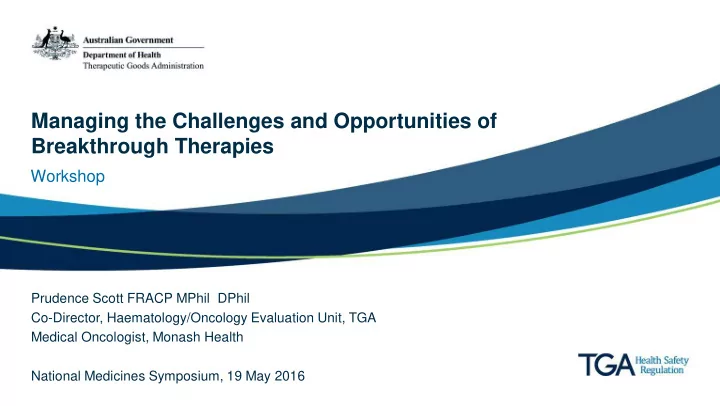

Managing the Challenges and Opportunities of Breakthrough Therapies Workshop Prudence Scott FRACP MPhil DPhil Co-Director, Haematology/Oncology Evaluation Unit, TGA Medical Oncologist, Monash Health National Medicines Symposium, 19 May 2016
Goal of this workshop • Foundations stream was asked to address the following: – Evidence – Safety – Knowledge – Quality Goal: gather input, ideas, feedback on managing these key areas for medicines approved on early data National Medicines Symposium, 19 May 2016
Pathway to registration ‘80s, ‘90s, 2000s Phase I, II and III clinical trials Phase I: safety, tolerability, dose selection Phase II: safety, efficacy, dose comparisons in range of cancers Phase III: comparison with existing standard of care, used for registration National Medicines Symposium, 19 May 2016
Emergence of targeted therapies 2001- Drug or other substance that interferes with specific molecules involved in cancer cell growth and survival (NCI) • “Driver mutations” or critical pathways • Specific populations • Biomarkers National Medicines Symposium, 19 May 2016
Targeted therapies Seamless oncology trials • PK, PD, efficacy and safety “Phase I” • Expansion cohorts once dose-finding complete needs a new name: suggestions? • Biomarker assessment • Studies of efficacy and safety • Multiple open label, single arm cohorts within Phase II trials - “octopus” Phase II • Master protocols • Biomarker validation +/- test development Phase III • Confirmatory National Medicines Symposium, 19 May 2016
Regulatory response to unmet need 1992 FDA accelerated approval • unmet need • significant benefit over existing therapies • surrogate endpoint likely to predict clinical benefit • confirmatory data required • Label states in indication that approval is based on an early endpoint and may require confirmation National Medicines Symposium, 19 May 2016
Accelerated approvals in Haematology/Oncology • Confirmation of benefit following accelerated approval – 50% confirmed – 40% still underway – 10% benefit not confirmed reasons National Medicines Symposium, 19 May 2016
Regulatory and advocate response to unmet need FDA Breakthrough Designation 2012 • Preliminary clinical data suggests a substantial benefit over existing therapies for serious or life-threatening disease or condition • Access, support in clinical trial design from FDA • Accelerated approval not guaranteed National Medicines Symposium, 19 May 2016
Breakthrough designations 338 in total 137 (41%) in Haem Onc 38% granted 38% denied 20% withdrawn 201 (59%) other areas incl rare inherited disorders, ID National Medicines Symposium, 19 May 2016
FDA pathway approvals in Haematology/Oncology Of 46 new drugs approved in last 4 years (30 in last 2 years!) • 17 accelerated approval • 29 regular approval • 19 had breakthrough designation National Medicines Symposium, 19 May 2016
TGA submissions in Haematology/Oncology Registration in Australia now sought on earlier data for Haematology/Oncology products 2014 2015 85% 75% National Medicines Symposium, 19 May 2016
Opportunities from breakthrough designation • Recognition of, resulted from patient voice • Earlier approval addressing unmet need • Ensures patients have access to optimally designed trials • What % of patients enter clinical trials in oncology? • Novel clinical trial designs emerging • Encourages and fosters innovation e.g. small pharma • New ways to use big data to analyse outcomes National Medicines Symposium, 19 May 2016
Challenges with early approvals 1. Rapid product development : – Less known about safety and efficacy – Multiple trials still to report – Biomarker development, validation, testing may still be underway Companion diagnostic vs complementary diagnostic – Incorporation of patient-reported outcomes eg PRO-CTCAE, COA Compendium 2. Collection, communication of post approval information – Patients, clinicians, regulators, sponsors, payers – Need reporting of adverse events by all stakeholders – Effective communication of updates 3. Timely completion of confirmatory trials and to act upon outcomes 4. Development of systems to capture big data e.g. INFORMED National Medicines Symposium, 19 May 2016
Information Exchange and Data Transformation (INFORMED) FDA Entrepreneur in Residence program • to support meta-analyses and other data explorations that can yield groundbreaking scientific and regulatory insights • to create a big data environment comprised of aggregated datasets from: – new drug applications (NDAs) – electronic medical records – wearable technologies – social media networks National Medicines Symposium, 19 May 2016
Summary of breakthrough designation era Better drugs Better biomarkers Less information National Medicines Symposium, 19 May 2016
Communicating decision to approve on early data 1. *Note to the Indication 2. *Boxed warning in PI, equivalent in CMI 3. Statement in Clinical Trials section re evidence base and further trials required to be submitted as condition of registration (similar in CMI) 4. Conditions of registration – Confirmatory efficacy and safety Phase III study/studies – Marketing of note to the indication, boxed warning in any promotional materials 5. Post approval requirements – case-by-case – big data /real world data collection e.g. registries – key info for stakeholders – patient/doctor information cards – health professional educational material National Medicines Symposium, 19 May 2016
Goal of this workshop • Foundations stream was asked to address the following: – Evidence – Safety – Knowledge – Quality Goal: gather input, ideas, feedback on managing these key areas for medicines approved on early data National Medicines Symposium, 19 May 2016
Post approval How can we improve reporting of outcomes to the TGA? • immediately • longer term How can the TGA communicate any necessary changes effectively to stakeholders? How can registries capture efficacy and safety for medicines approved on early data? National Medicines Symposium, 19 May 2016
Post approval How can we improve reporting of outcomes to the TGA? • immediately • longer term National Medicines Symposium, 19 May 2016
Post approval How can the TGA communicate any necessary changes effectively to stakeholders? National Medicines Symposium, 19 May 2016
Post approval How can registries capture efficacy and safety for medicines approved on early data? National Medicines Symposium, 19 May 2016
Post approval Any other issues? National Medicines Symposium, 19 May 2016
Recommend
More recommend